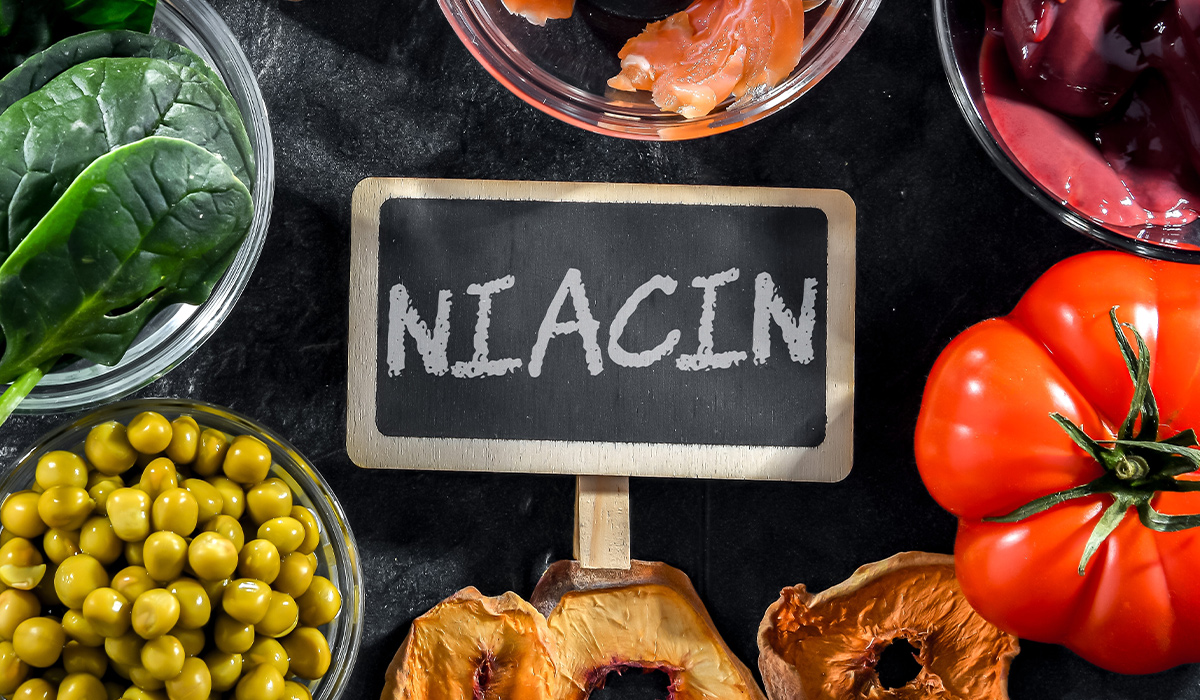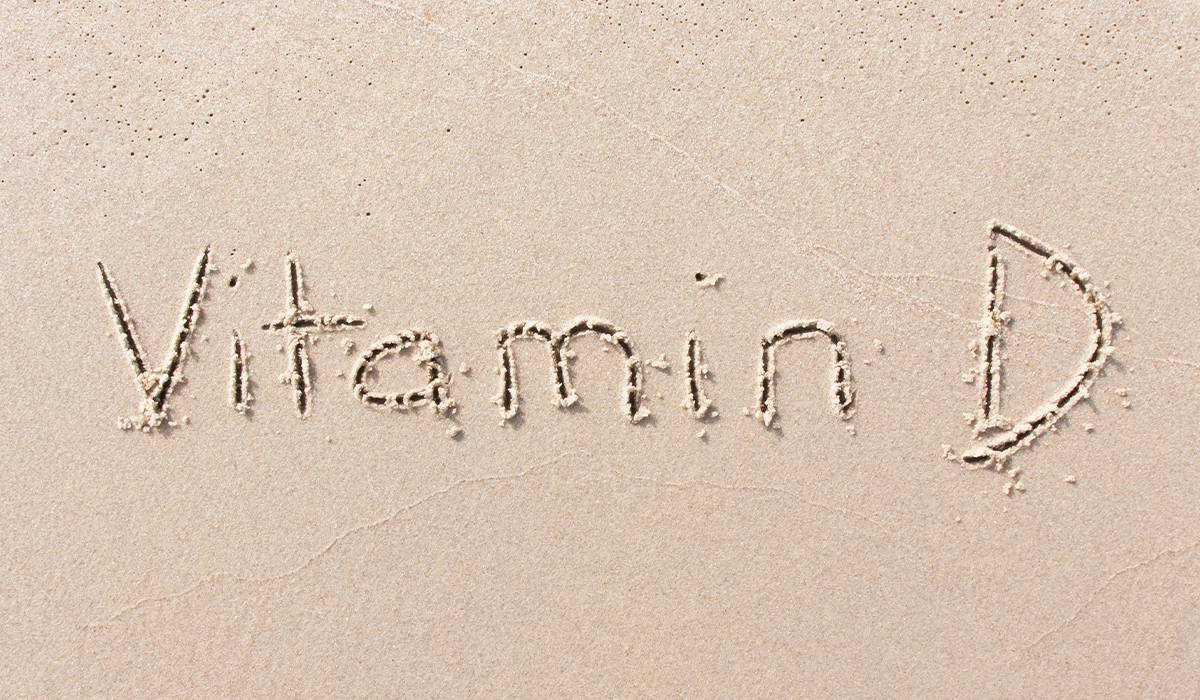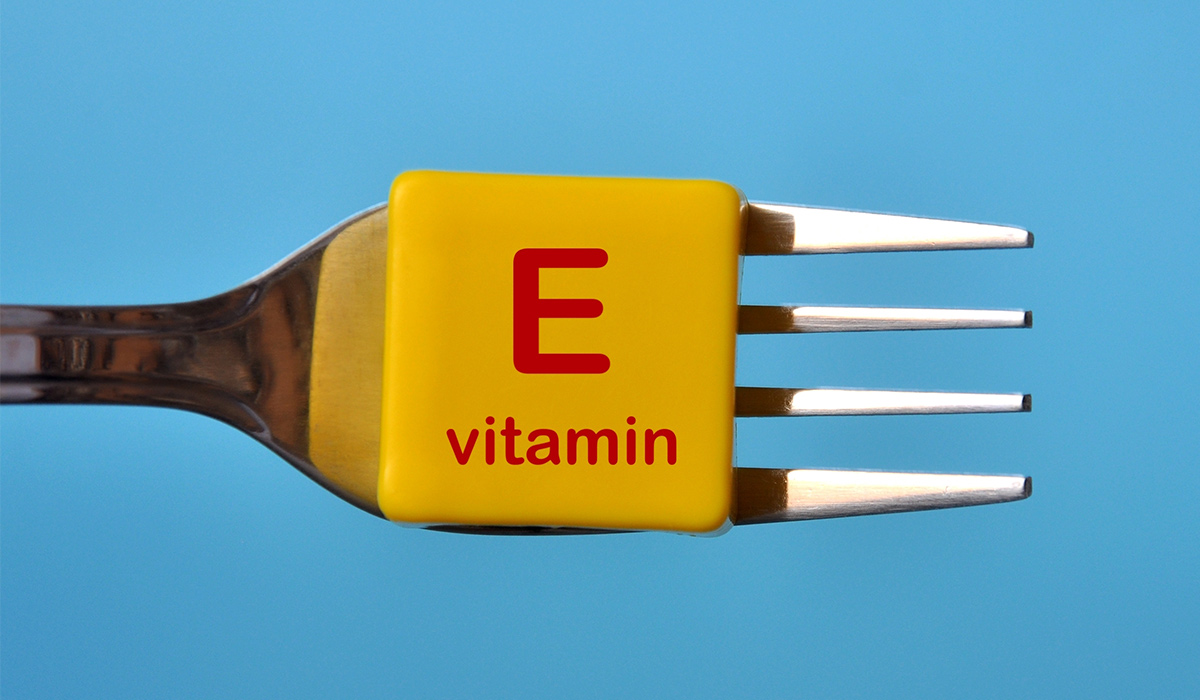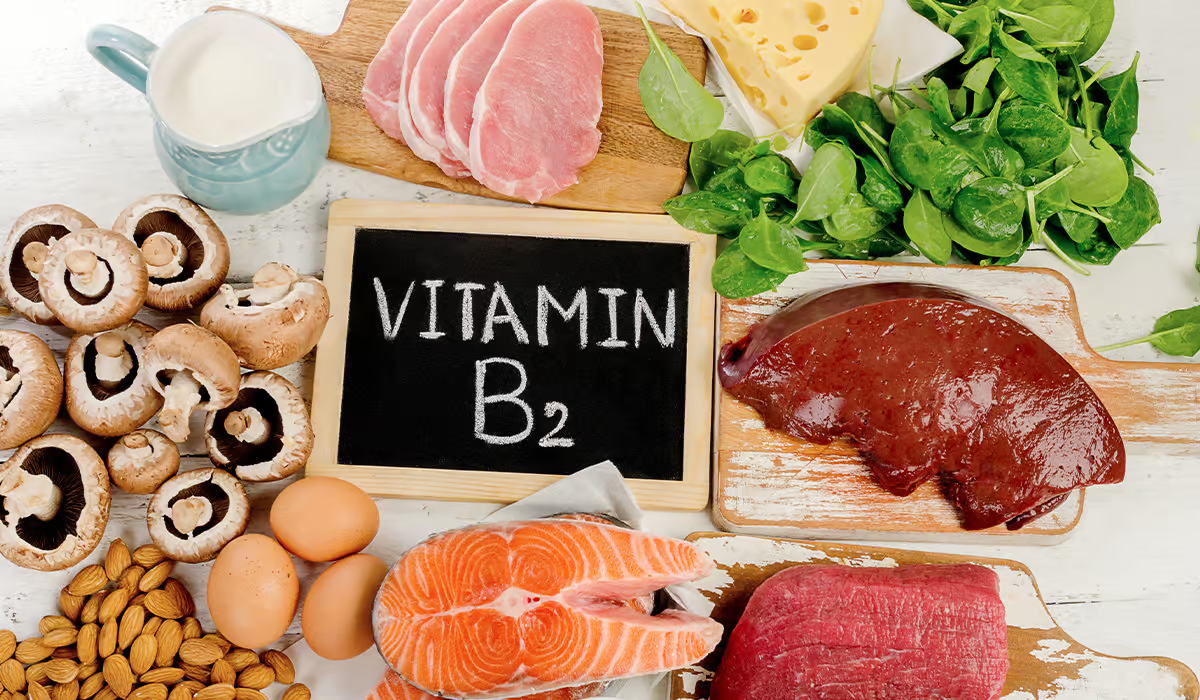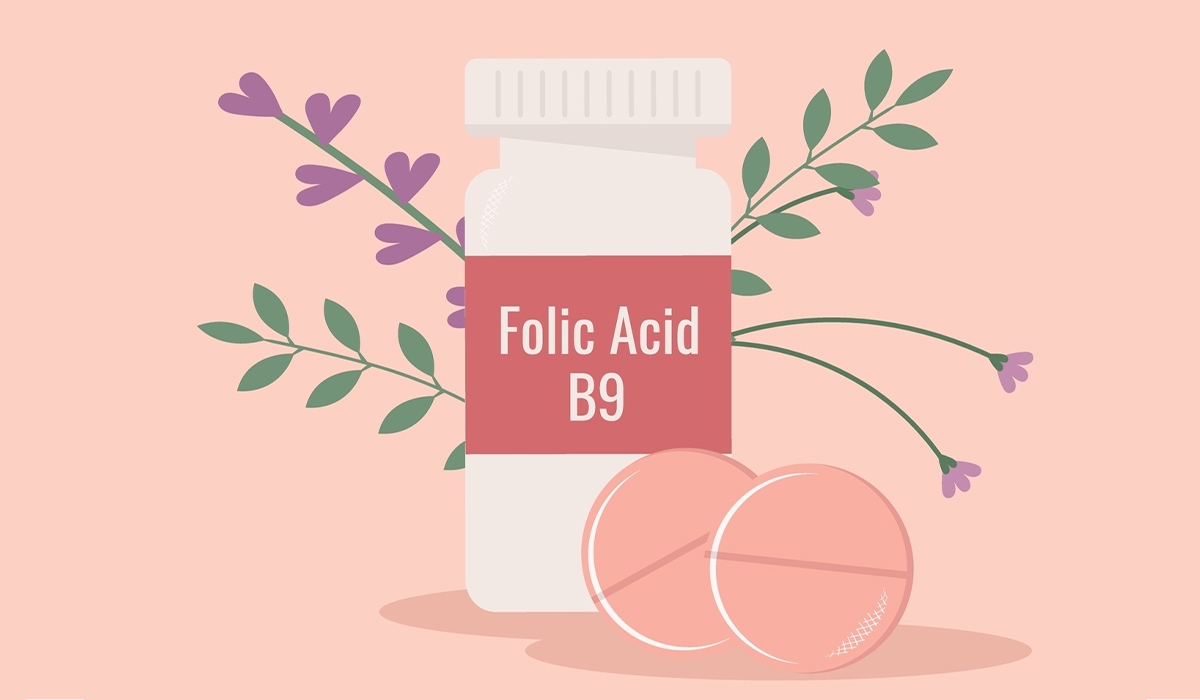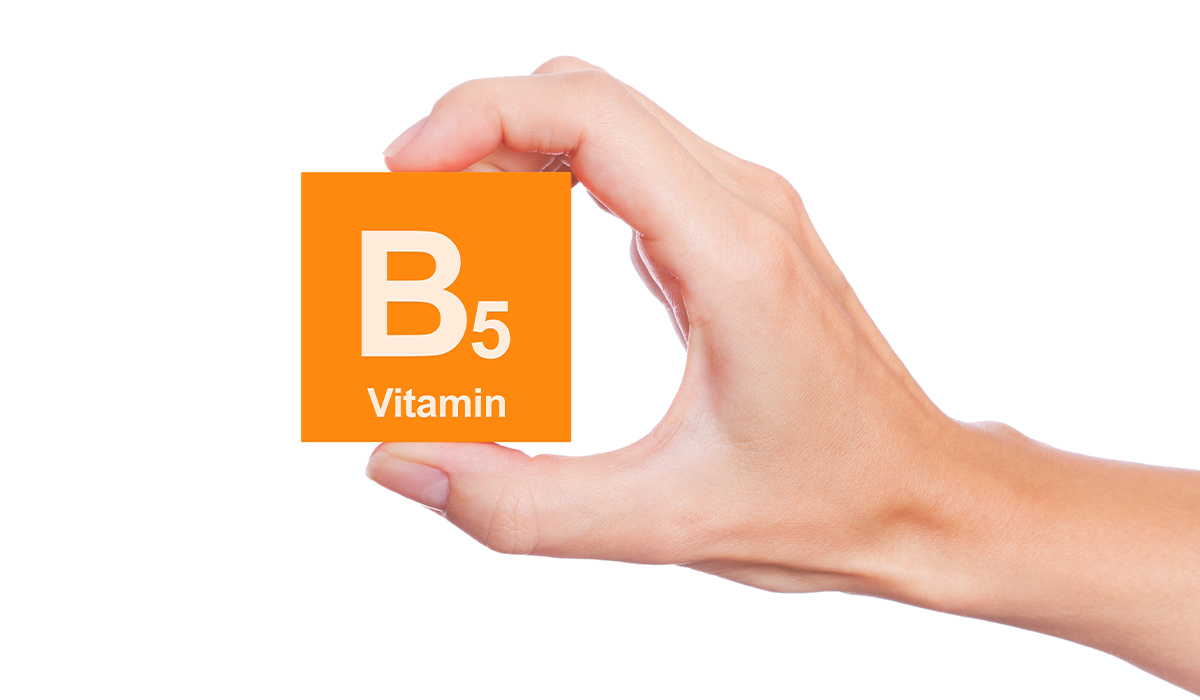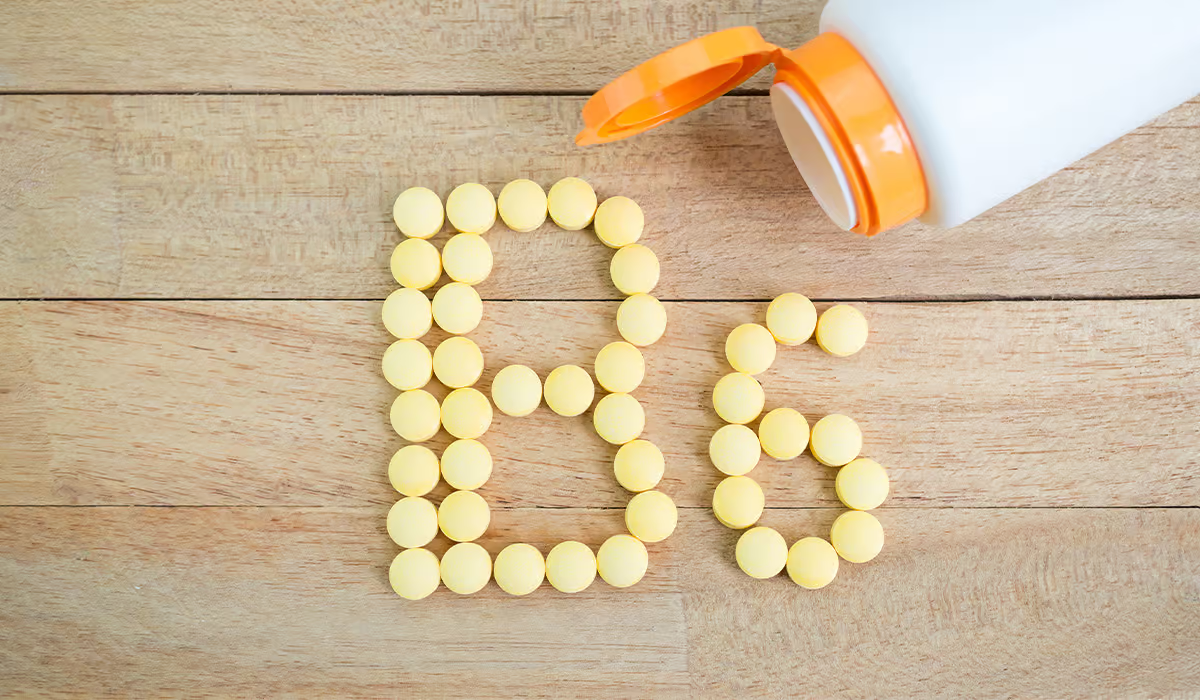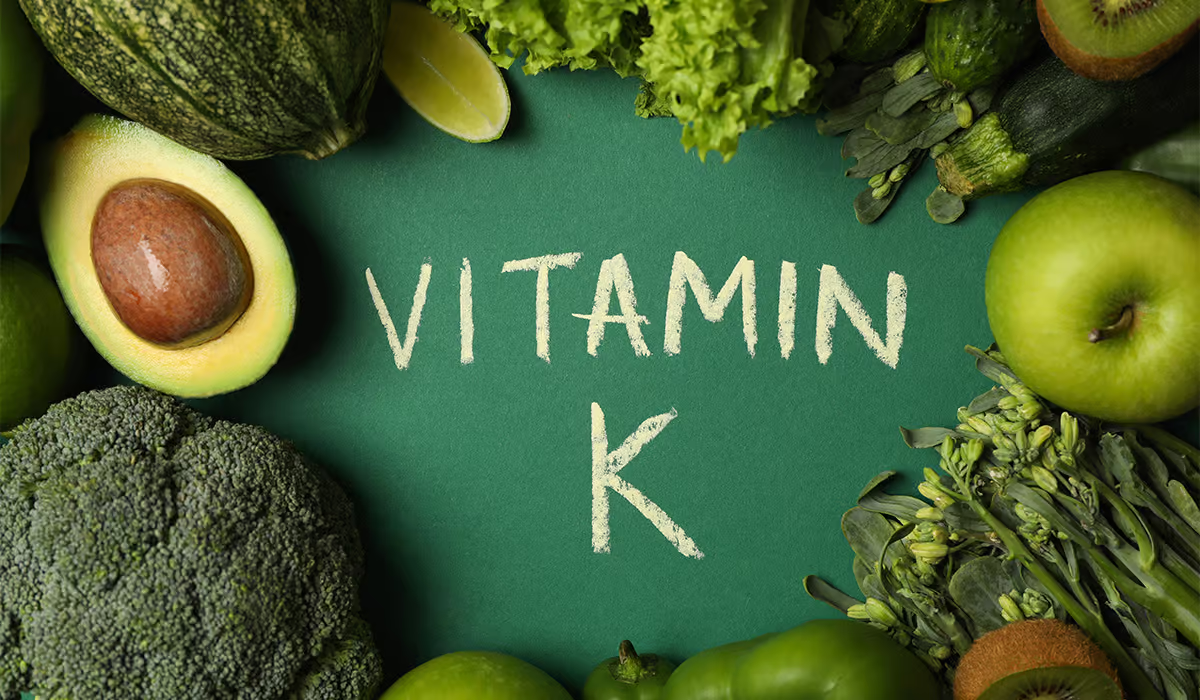In this article, you will find the following information about Vitamin B12:
- What is the role of this vitamin in your body?
- How much Vitamin B12 do you need daily
- In what foods can you find this vitamin?
- What are the causes and symptoms of its deficiency?
- Can you overdose on Vitamin B12?
- Risk groups of its deficiency
- Why should vegans and vegetarians supplement it?
The Role of Vitamin B12 in your body
Vitamin B12 belongs to water-soluble vitamins. It is also called cobalamin since it contains cobalt as the central atom. Bacteria found in the digestive tract of mammals produce cobalamin.
In our human bodies, Vitamin B12 is produced in the large bowel. From there it cannot be absorbed anymore. Therefore, it must be provided with food.
Vitamin B12 in food is bound to protein and must be released before it can be absorbed. It is freed by the action of hydrochloric acid and gastric enzymes in the stomach, where it binds to apocrine, a vitamin B12-binding protein. In the duodenum, digestive enzymes release vitamin B12 from the apocrine. Vitamin B12 absorption from the digestive tract takes place in the ileum (distal part of the small bowel). For the process to occur, the presence of intrinsic factor (IF) produced in the stomach by parietal cells is necessary.
The proper functioning of the body relies heavily on Vitamin B12. Hematopoietic processes require it – it aids in the red blood cells formation.
It also has a significant effect on the nervous system’s functioning. Cobalamin is necessary for the myelin sheaths construction (the layer that surrounds the nerve fibers) and participates in the formation of neurotransmitters.
Vitamin B12, like other B-group vitamins, affects the metabolism of fats and carbohydrates. It also participates in the synthesis of proteins and the transformation of bases that build DNA (purines and pyrimidines) and is essential in the conversion of folic acid (Vitamin B9) to biologically active forms.
How much Vitamin B12 do you need?
The daily requirement for vitamin B12 varies depending on the stage of life. The daily requirement for vitamin B12 is rising during pregnancy and lactation. The body is estimated to absorb about half of the vitamin B12 supplied with food.
Recommended Dietary Allowances for Vitamin B12 in individual groups are:
- Birth to 6 months – 0.4 mcg
- 7 to 12 months – 0.5 mcg
- 1 to 3 years – 0.9 mcg
- 4 to 8 years – 1.2 mcg
- 9 to 13 years – 1.8 mcg
- 14 to 18 years – 2.4 mcg
- 19+ years – 2.4 mcg
- Pregnancy – 2.6 mcg
- Lactation – 2.8 mcg
Food sources

Natural sources of vitamin B12 are:
- liver
- meat (beef, pork, poultry)
- milk
- eggs
- fish
- seafood (oysters, lobsters, and shellfish)
- cheeses
- mushrooms
Breast milk is also a source of vitamin B12 (contains 0.44 mcg /L). For formula-fed infants, you can usually find products fortified with vitamin B12.
It is worth noting that not all food sources absorb to the same extent. The body absorbs vitamin B12 from dairy products up to three times more than meat.
Examples of foods and the amount of vitamin B12 they contain per 100 grams:
- Beef liver – 70.7 mcg
- Clams (100 grams) – 17 mcg
- Nutritional yeast, fortified (1/4 cup) – 8 – 24 mcg
- Beef, ground, 80% lean meat / 20% fat, raw – 2.4 mcg
- Salmon – 2.6 mcg
- Tuna – 2.5 mcg
- Milk 2% (1 cup) – 1.3 mcg
- Breakfast cereals, fortified – 0.6 mcg
- Cheese, cheddar – 1 mcg
- Egg (1 large) – 0.5 mcg
- Turkey – 0.3 mcg
Deficiency
Because vitamin B12 is available in everyday foods, it is rare for a significant dietary deficiency to happen. The exception is people who do not consume meat and animal products, who should use appropriate supplementation.
Body stores of vitamin B12 are about 4 mg, of which about 1 mg is in the liver. The body loses 0.3% of its total vitamin B12 storage daily, so it may take 1-3 years to exhaust the supply. After such a period of lack of it in food or interruption of its absorption from the gastrointestinal tract, vitamin b12 deficiency occurs.
Vitamin B12 deficiency causes
In the case of severe deficiencies, the most common cause is malabsorption caused by the impaired structure of the Castle factor or disorders of receptors in the ileum.
Reasons for these conditions may be varied, e.g.,
- Addison-Biermer or pernicious anemia (an autoimmune disease leading to damage to the stomach cells that produce Castle intrinsic factor),
- Crohn’s disease is also a risk factor for vitamin B12 deficiency. This disease frequently involves the inflammation of the terminal ileum (the part where vitamin B12 is absorbed).
- conditions after removal of the stomach or ileum,
- bacterial overgrowth syndrome,
- congenital intrinsic factor deficiency, and others.
Another cause may be transcobalamin deficiency which is a protein responsible for vitamin B12 transport in the blood.
Regarding minor deficiencies of vitamin B12 in the body, the following may be responsible: vegan or vegetarian diet, malnutrition, or alcoholism.
Also, some medications reduce the absorption of vitamin B12.
Symptoms
Symptoms of vitamin B12 deficiency concern the circulatory, digestive, and nervous systems. A deficiency of vitamin B12 and folic acid also causes symptoms that appear in psychiatric diseases.
Symptoms of vitamin B12 deficiency include:
- fatigue
- pale or yellowish skin
- headaches and dizziness
- prematurely grey hair
- loss of taste
- sore and red tongue
- weight loss
- loss of appetite – meat aversion
- mouth ulcers
- diarrhea or constipation
Neurological symptoms include:
- developmental delay in children
- paraesthesia (pins and needles)
- Lhermitte sign – a feeling of electricity passing along the spine when tilting the head forward.
- loss of vibration and deep sensation (the sense of orientation of body parts)
- vision problems
- walking abnormality
Mental symptoms that may occur include:
- depressive disorders
- hypomanic syndromes (hypomania) – a state of excessively elevated mood
- emotional lability
- personality and behavior changes
- psychosis (losing contact with reality)
- hallucinations
How to diagnose Vitamin B12 deficiency?
Blood tests are the basis of the Vitamin B12 deficiency diagnostic process.
The basic test is blood count and vitamin B12 concentration. You should report for blood collection in the morning on an empty stomach.
To accurately determine the level of vitamin B12 in our bodies, additional tests can provide valuable insights. Healthcare professionals may utilize various tests, such as measuring methylmalonic acid, homocysteine, and the concentration of transcobalamin.
A blood test can show:
- reduced number of red blood cells
- enlarged erythrocytes
- low hemoglobin (a protein found in red blood cells that carries oxygen)
- decreased vitamin B12 levels in plasma
In finding the cause of a vitamin B12 deficiency, it is often necessary to perform a gastroscopy. Gastroscopy is a test that makes possible visual examination of the throat, esophagus, and stomach by inserting a flexible gastroscope tube through the mouth.
Megaloblastic anemia
Anemia occurs when hemoglobin concentration drops below 13 g/dl in adult men or 12 g/dl in adult women (<11 g/dl in pregnant women).
Anemia classification according to its severity:
- mild anemia – Hb 10–12.0 g/dl (or 13 in men)
- moderate anemia – Hb 8–9.9 g/dl
- severe anemia – Hb 6.5–7.9 g/dl
- life-threatening anemia – Hb <6.5 g/dl
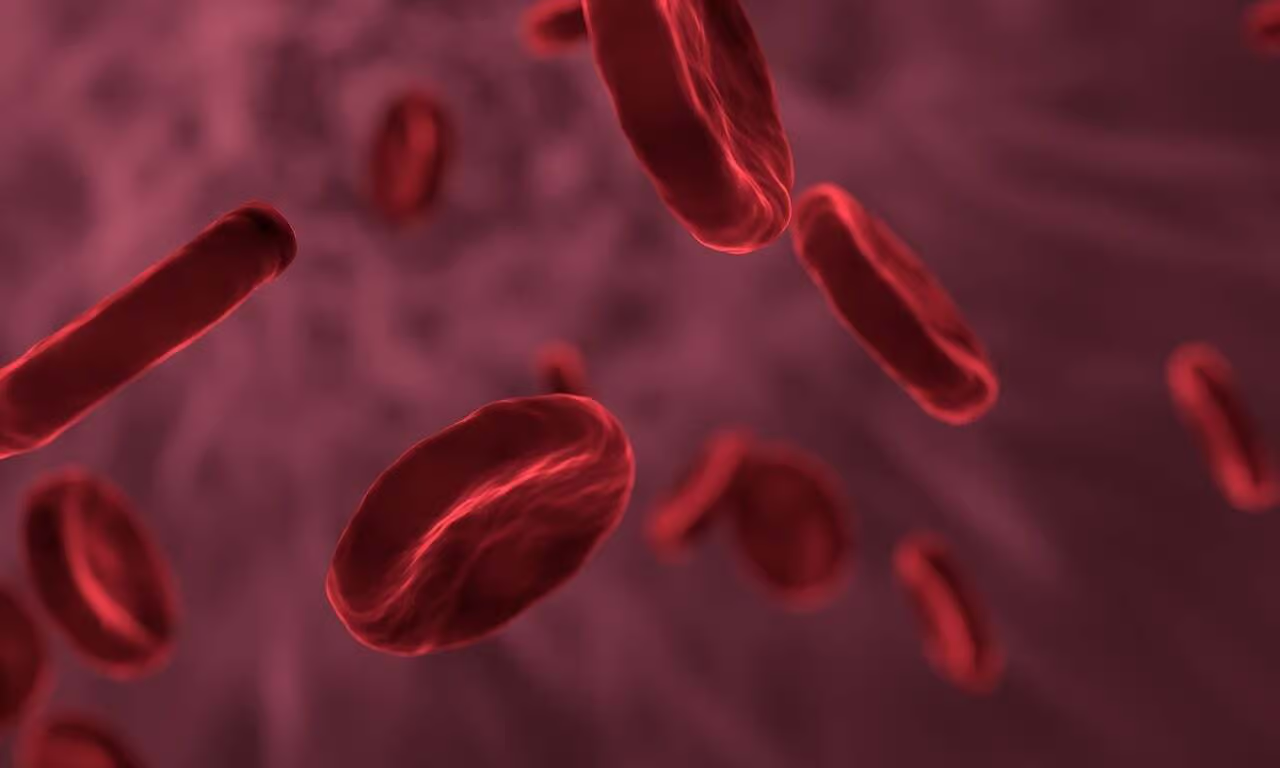
Blood components are produced in the bone marrow. The production of erythrocytes requires the provision of building components, which are iron, folic acid, and vitamin B12. If any of these are missing, red blood cell production is impaired.
If vitamin B12, folic acid, or both are deficient, this leads to the development of megaloblastic anemia. The name comes from the abnormal size of the erythrocytes, which are too large (MCV Mean Cell Volume >100fL). Abnormal blood cells are characterized by abnormal appearance, shortened lifespan, and inability to function properly.
Symptoms include the classic symptoms of anemia (weakness, pale skin, difficulty concentrating, dizziness, tachycardia) and digestive tract symptoms such as weight loss and loss of appetite, loss of taste, red and sore tongue, nausea, diarrhea, or constipation.
Treatment of vitamin B12 deficiency anemia consists of removing or treating the cause of the deficiency and supplementing the vitamin.
Nervous system damage and neurodegenerative diseases
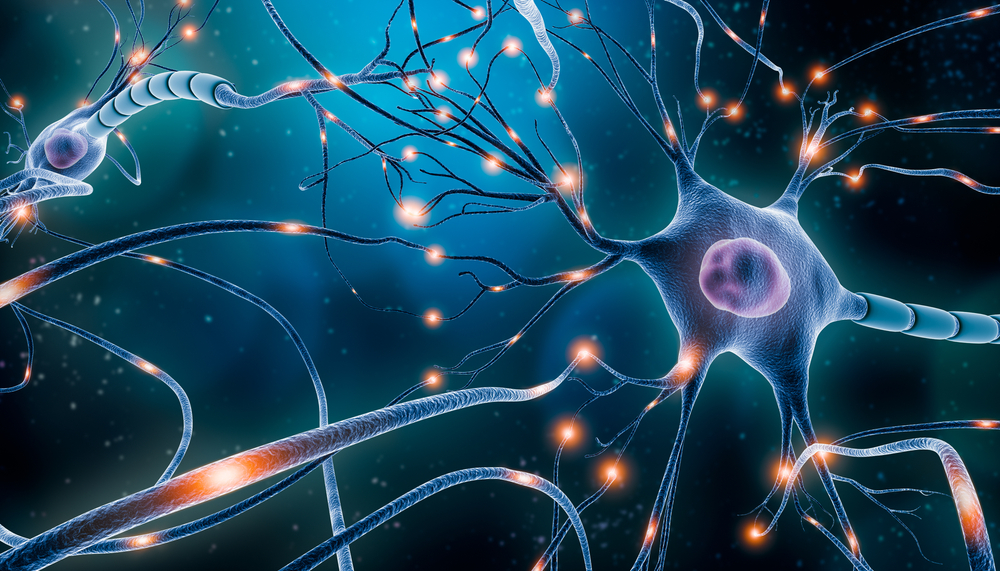
Vitamin B12 is essential for the proper functioning of the nervous system. It is necessary for the regeneration and formation of nerve fiber sheaths (myelin sheaths), which act as an electrical insulators of nerve cells and ensure proper and effective nerve conduction.
Myelin sheaths impairment can manifest as paresthesia, sensory disturbances, blurry vision, and gait problems.
Mental disorders
Vitamin B12 is also involved in the production of important messenger substances, such as neurotransmitters or hormones that control the work of your brain, thus shaping our perception, and affecting mood and state of mind.
For this reason, vitamin B12 deficiency can manifest in psychiatric symptoms such as depression, mood disorders, hallucinations, delusions, and dementia.
Fetal developmental defects and miscarriages
Folic acid and vitamin B12 play a crucial role in the development of the fetal nervous system.
The neurological and developmental delays in children that result from vitamin B12 deficiency during pregnancy are irreversible. So, if you have a deficiency of this vitamin, it is worth enriching the diet with products containing large amounts of vitamin B12 as soon as possible, and in the event of large deficiencies – start supplementation.
Vitamin B12 deficiency in pregnancy is associated with an increased risk of many maternal and fetal ailments:
- neural tube defects (defects of the brain, spine, or spinal cord)
- preeclampsia (a condition in which abnormal blood flow in the placenta causes high blood pressure in the pregnant woman and oxygen deficiency in the fetus)
- intrauterine growth retardation
- early miscarriage
Prognosis
Depending on the cause of vitamin B12 deficiency, supplementation may be necessary for several months or the rest of your life.
Megaloblastic anemia is fully reversible. Nerve damage (peripheral neuropathy) can partially heal (usually within six months).
In patients with Addison-Biermer disease, the risk of gastric cancer is 2-3 times higher.
How to prevent vitamin B12 deficiency?
The best way to ensure proper vitamin levels in the body is a proper, balanced diet and regular preventive examinations.
It is important to avoid excessive alcohol consumption.
In the case of the use of drugs that can reduce vitamin B12 absorption, it is advisable to control the blood count during therapy, and at the same time to limit it to the necessary minimum. However, this must be the doctor’s decision. Never stop or reduce your prescribed medication on your own!
Toxicity
There is no upper intake level of vitamin B12. Since vitamin B12 belongs to water-soluble vitamins, the body removes its excess through urine. There are no known cases of vitamin B12 overdose. However, you should not use any supplements in very high doses without consulting your doctor first.
Groups at risk of Vitamin B12 deficiency
Seniors
1 in 10 people over 75 are deficient in vitamin B12. Due to the higher incidence of diseases affecting the absorption of vitamin B12 in the elderly, the absorption of vitamin B12 is reduced. These diseases include:
- Pernicious anemia occurs in about 25% of older adults who are deficient in vitamin B12.
- Helicobacter pylori infection (bacteria that causes gastritis, which leads to malabsorption).
- Atrophic gastritis is more than three times more common in older adults than in the general population. This condition causes a decrease in the secretion of hydrochloric acid and intrinsic factors, which results in malabsorption of vitamin B12 from food.
People after surgery to remove the stomach or ileum
The stomach’s cells produce Castle’s factor. Its combination with vitamin B12 is necessary for its absorption. Absorption itself takes place in the ileum. After surgery involving the removal of the stomach or small intestine, e.g., in people with cancer, the absorption of vitamin B12 is impaired. In such people, intramuscular injections of vitamin B12 are necessary.
People with diseases of the digestive system
People suffering from gastrointestinal diseases such as Crohn’s disease, atrophic gastritis, or celiac disease are at risk of insufficient absorption of cobalamin.
Treatment of vitamin B12 deficiency
Treatment of vitamin b12 deficiency consists in removing or treating its cause and supplementing the deficiency of the vitamin.
Depending on the cause and patient’s condition the following forms of treatment can be used:
- intramuscular or subcutaneous injections – in the case of very large deficiencies and when proper absorption from the digestive system is impossible.
- oral supplementation
- introducing more meat products into the diet
Interactions with medications
Some medications can reduce the absorption of vitamin B12. These drugs include
- PPIs, proton pump inhibitors. These drugs are used to treat conditions such as peptic ulcers and GERD. These drugs reduce the secretion of hydrochloric acid in the stomach. This can cause a reduction in the absorption of vitamin B12 because the presence of gastric juice is necessary for its absorption from food.
- Histamine H2 blockers (medications used in heartburn treatment)
- Contraceptive pills
Why should vegans and vegetarians supplement vitamin B12?
People who do not consume animal products are at risk of vitamin B12 deficiency. Plant products, even if they contain trace amounts of vitamin B12, are not a sufficient source of it and are poorly absorbed. Therefore, the best source of this vitamin for people following a vegan diet is fortified products (fortified breakfast cereal and nutritional yeast) and dietary supplements.
When should you see a doctor?
If you are in the group of people at risk of vitamin B12 deficiency or experience symptoms of its deficiency, you should consult your doctor who will decide whether it is necessary to perform tests assessing the content of cobalamin in the body.
Sources
- Institute of Medicine, Food and Nutrition Board.
Dietary Reference Intakes for Thiamin, Riboflavin, Niacin, Vitamin B(6), Folate, Vitamin B(12), Pantothenic Acid, Biotin, and Choline. Washington, DC: National Academies Press; 1998. https://www.ncbi.nlm.nih.gov/books/NBK114310/ - National Institutes of Health (2022) Vitamin B12
https://ods.od.nih.gov/factsheets/VitaminB12-HealthProfessional/ - Watanabe F, Yabuta Y, Bito T, Teng F. Vitamin B₁₂-containing plant food sources for vegetarians. Nutrients. 2014 May 5;6(5):1861-73. doi: 10.3390/nu6051861. PMID: 24803097; PMCID: PMC4042564.
https://pubmed.ncbi.nlm.nih.gov/24803097/ - Henjum S, Manger M, Hampel D, Brantsæter AL, Shahab-Ferdows S, Bastani NE, Strand TA, Refsum H, Allen LH. Vitamin B12 concentrations in milk from Norwegian women during the six first months of lactation. Eur J Clin Nutr. 2020 May;74(5):749-756. doi: 10.1038/s41430-020-0567-x. Epub 2020 Jan 30. PMID: 32001810; PMCID: PMC7214247.
https://www.ncbi.nlm.nih.gov/pmc/articles/PMC7214247/ - Hawes D, Shute PE, Dicke O, Paul SP. Vitamin B12 deficiency presenting with solid food aversion and global developmental delay in a child. Br J Hosp Med (Lond). 2014 Jun;75(6):352-3. doi: 10.12968/hmed.2014.75.6.352. PMID: 25040415.
https://pubmed.ncbi.nlm.nih.gov/25040415/ - Sharawat, I.K., Panda, P.K. Megaloblastic Madness: A Reversible Neuropsychiatric Condition. Indian J Pediatr 88, 174 (2021). https://doi.org/10.1007/s12098-020-03403-y
https://link.springer.com/article/10.1007/s12098-020-03403-y - Ito T, Jensen RT. Association of long-term proton pump inhibitor therapy with bone fractures and effects on absorption of calcium, vitamin B12, iron, and magnesium. Curr Gastroenterol Rep. 2010 Dec;12(6):448-57. doi: 10.1007/s11894-010-0141-0. PMID: 20882439; PMCID: PMC2974811.
https://pubmed.ncbi.nlm.nih.gov/20882439/ - Berenson AB, Rahman M. Effect of hormonal contraceptives on vitamin B12 level and the association of the latter with bone mineral density. Contraception. 2012 Nov;86(5):481-7. doi: 10.1016/j.contraception.2012.02.015. Epub 2012 Mar 28. PMID: 22464408; PMCID: PMC3410054.
https://www.ncbi.nlm.nih.gov/pmc/articles/PMC3410054/ - National Health Service (2023) Vitamin B12 or folate deficiency anaemia.
https://www.nhs.uk/conditions/vitamin-b12-or-folate-deficiency-anaemia/ - Majumder S, Soriano J, Louie Cruz A, Dasanu CA. Vitamin B12 deficiency in patients undergoing bariatric surgery: preventive strategies and key recommendations. Surg Obes Relat Dis. 2013 Nov-Dec;9(6):1013-9. doi: 10.1016/j.soard.2013.04.017. Epub 2013 May 24. PMID: 24091055. https://pubmed.ncbi.nlm.nih.gov/24091055/
- Guéant JL, Guéant-Rodriguez RM, Alpers DH. Vitamin B12 absorption and malabsorption. Vitam Horm. 2022;119:241-274. doi: 10.1016/bs.vh.2022.01.016. Epub 2022 Mar 1. PMID: 35337622.
https://pubmed.ncbi.nlm.nih.gov/35337622/ - Sahu P, Thippeswamy H, Chaturvedi SK. Neuropsychiatric manifestations in vitamin B12 deficiency. Vitam Horm. 2022;119:457-470. doi: 10.1016/bs.vh.2022.01.001. Epub 2022 Mar 3. PMID: 35337631.
https://pubmed.ncbi.nlm.nih.gov/35337631/ - Serin HM, Arslan EA. Neurological symptoms of vitamin B12 deficiency: analysis of pediatric patients. Acta Clin Croat. 2019 Jun;58(2):295-302. doi: 10.20471/acc.2019.58.02.13. PMID: 31819326; PMCID: PMC6884369.
https://www.ncbi.nlm.nih.gov/pmc/articles/PMC6884369/ - U.S. Department of Agriculture.
FoodData Central. 2020.
- Vitamin B12: Role, Deficiency, Symptoms, and Treatment
- What is Vitamin B12?
- The Role of Vitamin B12 in your body
- How much Vitamin B12 do you need?
- Food sources
- Deficiency
- Toxicity
- Groups at risk of Vitamin B12 deficiency
- Treatment of vitamin B12 deficiency
- Interactions with medications
- Why should vegans and vegetarians supplement vitamin B12?
- When should you see a doctor?
